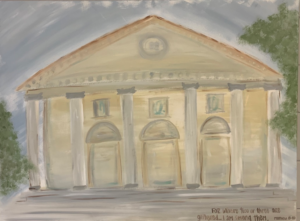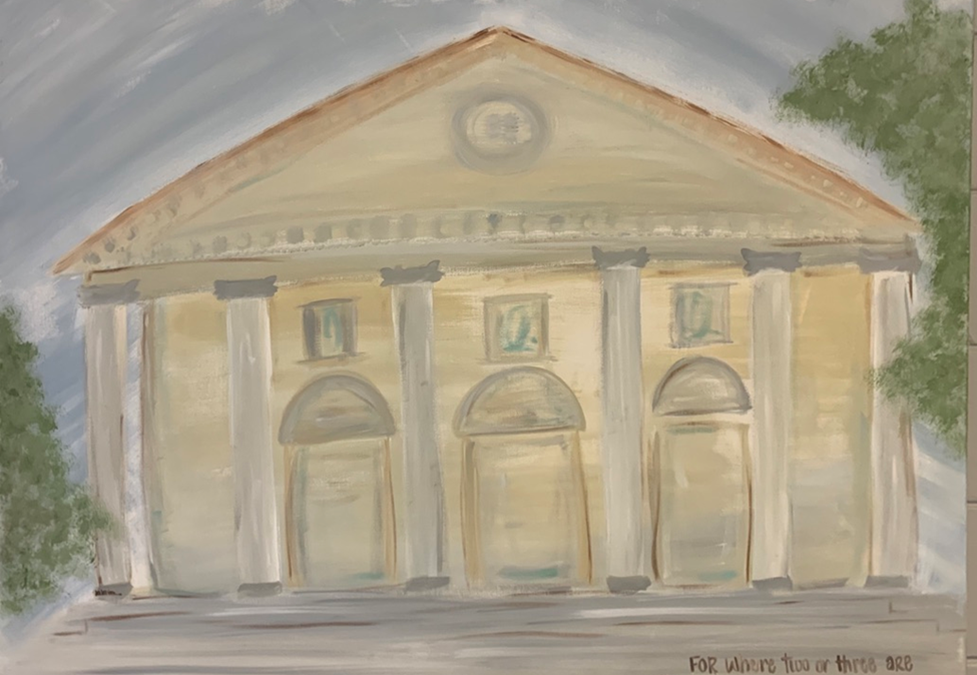A Legacy of Faith[i]
Rev. Dr. Glenda Hollingshead; October 30, 2022
21st Sunday after Pentecost; Reformation Sunday
Psalm 119:137-144; 2 Thessalonians 1:2-4, 11-12

“A Legacy of Faith” was created in 2021 by Presbyterian pastor, Rev. Carol Holbrook Pricket as a Reformation Lessons and Carols Service. With her permission, though, I have revised it to be more of a traditional service for us on this Reformation Sunday, a day when we celebrate how the church has grown and changed while seeking to be Christ’s body on earth.
The church we know and love today, First Presbyterian Church of Valdosta, did not come about by accident. We stand on the shoulders of countless generations who have sought to love and serve God, interpret the scriptures, and work out their faith in their day and time. This morning we celebrate this legacy by taking a journey through the PC(USA) Book of Confessions. Some of you are very familiar with the confessions; others are not. The confessions are, simply, statements of faith; the efforts of various people at various times to make some kind of coherent summary of what Christianity calls us to say and do. These confessions are part of our constitution as Presbyterians, meaning they guide and shape our life together. Pastors and elders vow to be guided by them. They are not scripture, and we do not believe or follow every word they say; but they do bear witness to the journey our ancestors have taken in gifting us with the church we know today.
We begin with “The Nicene Creed” which will serve as our “Affirmation of Faith” a little later in the service. It was 381 AD. The emperor Constantine had declared Christianity the one true unified religion of the Roman Empire—but found that Christianity was anything but unified. He had already convened one council to try to bring some order to this unruly young religion, but Christians with different perspectives on the divinity of Jesus continued to fight it out—sometimes with their pens, and sometimes with their fists! And so, in 381, another council came together, and adopted the Nicene Creed, which shares much language with the Apostles’ Creed, and is used by diverse traditions across the world.
For nearly 1500 years, that Catholic church grew and spread across the globe, and while it underwent change and transformation, it managed to mostly hang together until an earthquake hit it—an earthquake called the Protestant Reformation.
The Scots Confession was written in Scotland, of course, in 1560, in the course of just four days. In a time of political turbulence, it declares God’s everlasting power over the Kirk—the Scottish word for church—and indeed the whole world. This is a portion of what our ancestors proclaimed:
As we believe in one God, Father, Son, and Holy Ghost, so we firmly believe that from the beginning here has been, now is, and to the end of the world shall be, one Kirk… This Kirk is catholic, that is, universal, because it contains the chosen of all ages, of all realms, nations, and tongues, be they of the Jews or be they of the Gentiles…It is therefore called the communion, not of profane persons, but of saints, who, as citizens of the heavenly Jerusalem, have the fruit of inestimable benefits, one God, one Lord Jesus, one faith, and one baptism.[ii]
Over on the mainland, Lutherans, and Reformed Christians—what we know now as Presbyterians—were fighting over communion. And so, theologians from each camp sat down together in Germany to create a statement they could all agree with, to find words of unity and peace, and to remember that despite faithful disagreements, they ultimately all belonged to Christ. They wrote their confession as a series of questions, formally called a catechism. The first question of The Heidelberg Catechism is: What is your only comfort in life and in death? And the response is: That I am not my own, but belong—body and soul, in life and in death—to my faithful Savior, Jesus Christ. He has fully paid for all my sins with his precious blood, and has set me free from the tyranny of evil. He also watches over me in such a way that not a hair can fall from my head without the will of my Father in heaven; in fact, all things must work together for my salvation. Because I belong to him, Christ, by his Holy Spirit, assures me of eternal life and makes me wholeheartedly willing and ready from now on to live for him.
The Second Helvetic Confession was written by a Swiss pastor in 1561, designed as a practical guide for his congregation in living out their renewed faith. It emphasizes the Reformation conviction that faith is not a result of human insight or action, but a pure gift from God. Therefore, we are not saved by our faith, but by God’s grace, which we come to know and feel and experience through the faith God gives us. Listen for the wisdom of our ancestors:
Christian faith is not an opinion or human conviction, but a most firm trust and a clear and steadfast assent of the mind, and then a most certain apprehension of the truth of God presented in the Scriptures and in the Apostles’ Creed, and thus also of God himself, the greatest good, and especially of God’s promise and of Christ who is the fulfilment of all promises. But this faith is a pure gift of God, which God alone of his grace gives to his elect according to his measure when, to whom and to the degree he wills. And he does this by the Holy Spirit by means of the preaching of the Gospel and steadfast prayer.
A generation after the Reformation, a group of English theologians gathered to create a new confession. Over the course of more than a thousand meetings (how Presbyterian!), they created the Westminster Confession. In addition, this period produced two catechisms, one for preachers by a professor of divinity, the other for children by a professor of mathematics. Here are just two of the questions that the children were to memorize: Question 1: What is the chief and highest end of humanity? Answer: Humanity’s chief and highest end is to glorify God, and fully to enjoy him forever. Question 33: What is justification? Answer: Justification is an act of God’s free grace, wherein he pardons all our sins, and accepts us as righteous in his sight, only for the righteousness of Christ imputed to us, and received by faith alone.
Historians talk about the Reformation as a closed era in the past, but we who tell God’s story know that God is always forming and re-forming the church. We are jumping forward now, to the modern confessions, that wrestle with a changing world.
It was 1934, and the Nazi Party was on the rise in Germany, initiating a reign of cruelty, hate, and terror. Most German Christians found no problem with Hitler’s actions, declaring that their faith and their patriotism went hand in hand, and that Hitler’s rule was God’s will. A few Christians, however, resisted. Representatives from the Reformed, Lutheran, and United churches gathered to create a confession of faith to send to their fellow German Christians, urging them to display their freedom in Christ by standing firm against Hitler’s designs for Germany. While our situation is not theirs, we confess the eternal truth that the church was not meant to be co-opted by political forces, but clings only to Christ. Listen to the words of our ancestors in a portion of the Barmen Confession:
The Christian Church is the congregation of the people in which Jesus Christ acts presently as the Lord in Word and Sacrament through the Holy Spirit. As the Church of pardoned sinners, it has to testify in the midst of a sinful world, with its faith as with its obedience, with its message as with its order, that it is solely his property, and that it lives and wants to live solely from his comfort and from his direction in the expectation of his appearance.
The 1960s turned America upside down (some of you remember those days!). In the midst of so many different cultural tensions and conflicts, the northern Presbyterian Church adopted a new confession based around the idea that in Christ, the whole world is reconciled to God. Listen to a portion of the Confession of 1967:
God’s redeeming work in Jesus Christ embraces the whole of humanity’s life: social and cultural,
economic and political, scientific and technological, individual and corporate. It includes humanity’s natural environment as exploited and despoiled by sin. It is the will of God that his purpose for human life shall be fulfilled under the rule of Christ and all evil be banished from his creation. Biblical visions and images of the rule of Christ, such as a heavenly city, a father’s house, a new heaven and earth, a marriage feast, and an unending day culminate in the image of the kingdom. The kingdom represents the triumph of God over all that resists his will and disrupts his creation. Already God’s reign is present as a ferment in the world, stirring hope in people and preparing the world to receive its ultimate judgment and redemption. With an urgency born of this hope, the church applies itself to present tasks and strives for a better world…
Finally, we come to the Belhar Confession. It was 1986, and apartheid, the separation and treatment of people based on race, raged in South Africa. Some white Christians used scripture to justify this system, and so the Dutch Reformed Church wrote the Belhar Confession in protest, insisting that God’s vision for humanity was one of liberation, equality, unity, and communion. Let us listen to some of the words of our ancestors, translated to English from the original Afrikaans.
We believe that God has revealed himself as the one who wishes to bring about justice and true peace among people; that God, in a world full of injustice and enmity, is in a special way the God of the destitute, the poor and the wronged; that God calls the church to follow him in this, for God brings justice to the oppressed and gives bread to the hungry; that God frees the prisoner and restores sight to the blind; that God supports the downtrodden, protects the stranger, helps orphans and widows and blocks the path of the ungodly; that for God pure and undefiled religion is to visit the orphans and the widows in their suffering; that God wishes to teach the church to do what is good and to seek the right; that the church must therefore stand by people in any form of suffering and need…
Reformation Sunday is a good day to celebrate, to reflect, and to be reminded that we are the recipients of a deep and rich heritage. And now it falls to us to be the Reformers. But we need not fear. We need only look to Jesus, the pioneer and perfecter of our faith, who points us toward the future of his Church. Throughout his earthly ministry, Jesus showed mercy when mercy was needed. Jesus showed compassion when compassion was needed. Jesus spoke the truth when the truth was needed. Jesus embodied the words of Micah 6:8, “What does the Lord require of you but to do justice, and to love kindness, and to walk humbly with your God?” Let us go forth and do likewise—reformed and always being reformed!
(Silent Reflection)
[1][1] This program has been edited and used by permission. It was created by Rev. Carol Holbrook Pricket as “A Legacy of Faith: Reformation Lessons and Carols.”
[1] All confessional excerpts are from The PC(USA) Book of Confessions. Louisville: Office of the General Assembly, 2016. They have been lightly modernized with inclusive terms for humankind.
Cover photo by Kelly Williams, used by permission

